Accommodation · Asia · Bed & Breakfasts · Hotels · Japan · Regions
Top 10 luxury ryokans in Japan
Ryokans are the last word in luxury rest and relaxation in Japan. They are traditional style inns devoted to fine kaiseki traditional food, hot spring baths and the simple pleasures of life as it was lived before Japan hurtled into the slick, metallic 21st Century. Cedarwood baths, the poignant smell of tatami mat rooms, ornamental gardens and seasonal ingredients gathered from the local area – these are the kind of things that make a stay at a ryokan so distinctive and memorable, as well as the famous omotenashi Japanese way of hospitality in which your every need is anticipated without the fuss and bother we find in western hotels. A ryokan stay is also a great chance to escape the city as most of them are dotted about in peaceful rural locations and historic small towns the length of the country.
Here are ten truly outstanding ryokan including some historic ones as well as newer ones that approach the ryokan concept from a new angle with great success
Ryokan Kurashiki, Kurashiki
Three hundred years ago, Kurashiki was a set of storehouses along a canal. These distinctive white-walled, black-tiled buildings have now been converted into shops, museums and ryokan. Ryokan Kurashiki is a cosy yet luxurious traditional inn with just six rooms including a maisonette. The open beams and impressive collection of antique pieces can put one in mind of Britains best bed & breakfasts, but with Japanese tatami mat rooms, kaiseki multi-course meals and relaxing baths. A couple of the rooms have thick futon mattresses on raised platforms, while in the other rooms the futons are laid out traditionally on the tatami mat floor.
 Gora Kadan, Hakone
This is probably the most expensive property in Japan averaging £1,000 a night, but if you only ever stay in one ryokan make it this one. Built as a retreat for a high-ranking Imperial family, it looks more like a western villa from the outside as this was the architectural fashion at the time. But once inside it is a haven of dark wood beams, spacious tatami mat rooms with private gardens and cedarwood baths, and perhaps the highest standard of omotenashi hospitality to be found anywhere in Japan.
Gora Kadan, Hakone
This is probably the most expensive property in Japan averaging £1,000 a night, but if you only ever stay in one ryokan make it this one. Built as a retreat for a high-ranking Imperial family, it looks more like a western villa from the outside as this was the architectural fashion at the time. But once inside it is a haven of dark wood beams, spacious tatami mat rooms with private gardens and cedarwood baths, and perhaps the highest standard of omotenashi hospitality to be found anywhere in Japan.
 Beniya Mukayu, Yamashiro Onsen
When the current owners of the Beniya Mukayu inherited it from the previous generation, they completely remodelled it to create a fine fusion of the modern and the traditional. Each of the 17 tatami mat rooms has its own private hot spring bath looking out onto a garden with a traditional teahouse. Alongside it is a modern sculpture, and in the main building is a mesmerizing installation piece harnessing water droplets and designed by the director of Muji . Most luxury ryokan serve meals in the room, but Beniya has its own restaurant and its own take on Japanese kaiseki cuisine. It sounds like it shouldnt work, but it does, and the private elevator access to Yamashiros public hot spring baths completes the ingenious design. Rooms start at around £400 a night though this is very much dependent on the season with autumn being the most popular here.
Beniya Mukayu, Yamashiro Onsen
When the current owners of the Beniya Mukayu inherited it from the previous generation, they completely remodelled it to create a fine fusion of the modern and the traditional. Each of the 17 tatami mat rooms has its own private hot spring bath looking out onto a garden with a traditional teahouse. Alongside it is a modern sculpture, and in the main building is a mesmerizing installation piece harnessing water droplets and designed by the director of Muji . Most luxury ryokan serve meals in the room, but Beniya has its own restaurant and its own take on Japanese kaiseki cuisine. It sounds like it shouldnt work, but it does, and the private elevator access to Yamashiros public hot spring baths completes the ingenious design. Rooms start at around £400 a night though this is very much dependent on the season with autumn being the most popular here.
 Hanafubuki, Izu Peninsula
The Izu Peninsula is a set of scenic coastal train and bus rides, winding up to the centre with the hills fading away behind you like a Japanese scroll painting. The Hanafubuki is a set of scattered villas on the Jogosaki coastline, one of the most scenic parts for coastal walks as the geological layers of rock are exposed along the jagged coastline. There is an idiosyncratic nautical theme here, with the central dining area designed to look like a ship with topmast, sail and all! The location itself is very peaceful and makes for an excellent overnight stop between Tokyo and Kyoto as its straightforward to get back on the bullet train line from here.
Hanafubuki, Izu Peninsula
The Izu Peninsula is a set of scenic coastal train and bus rides, winding up to the centre with the hills fading away behind you like a Japanese scroll painting. The Hanafubuki is a set of scattered villas on the Jogosaki coastline, one of the most scenic parts for coastal walks as the geological layers of rock are exposed along the jagged coastline. There is an idiosyncratic nautical theme here, with the central dining area designed to look like a ship with topmast, sail and all! The location itself is very peaceful and makes for an excellent overnight stop between Tokyo and Kyoto as its straightforward to get back on the bullet train line from here.
 Iwaso, Miyajima
This is the place to stay on the island of Miyajima near Hiroshima, famous for its cherry blossom as well as its autumn leaves. Several other modern inns have sprung up on the island but the Iwaso is the original and best, opening its doors in the late 19th Century. Its just a short walk up from the famous floating red gate in the water, and the courtyard is postcard perfect with tame deer often wandering through. The interior has been renovated so rooms are bright and comfortable but with that quintessentially Japanese smell of tatami mats. Some have views of the shrine, but perhaps the most romantic are the Hanare cottages in the adjoining woods, where the only sounds are a distant waterfall and birdsong. Rooms start at around £400 including a kaiseki multi-course meal and breakfast both served in the comfort of your room.
Iwaso, Miyajima
This is the place to stay on the island of Miyajima near Hiroshima, famous for its cherry blossom as well as its autumn leaves. Several other modern inns have sprung up on the island but the Iwaso is the original and best, opening its doors in the late 19th Century. Its just a short walk up from the famous floating red gate in the water, and the courtyard is postcard perfect with tame deer often wandering through. The interior has been renovated so rooms are bright and comfortable but with that quintessentially Japanese smell of tatami mats. Some have views of the shrine, but perhaps the most romantic are the Hanare cottages in the adjoining woods, where the only sounds are a distant waterfall and birdsong. Rooms start at around £400 including a kaiseki multi-course meal and breakfast both served in the comfort of your room.
 Hoshinoya, Kyoto
Once a nobles retreat, this aesthetically stunning ryokan is reached by private boat down the Hozu river in scenic Arashiyama. This area is particularly stunning in autumn when the leaves turn red and gold, and the Hoshinoya is enveloped by the trees. Rooms with evocative names like Moon and Water take the traditional tatami mat design and incorporate modern designs such as bamboo-strip sofas and bed-style futons. A grain warehouse has been ingeniously converted into an intimate bar, but the exterior of the buildings are preserved. The place resonates with a long history of luxury and is also the most peaceful place to stay near Kyoto. Like the Gora Kadan, it averages £1,000 a night with dinner by the Michelin-starred chef Ichiro Kubota.
Hoshinoya, Kyoto
Once a nobles retreat, this aesthetically stunning ryokan is reached by private boat down the Hozu river in scenic Arashiyama. This area is particularly stunning in autumn when the leaves turn red and gold, and the Hoshinoya is enveloped by the trees. Rooms with evocative names like Moon and Water take the traditional tatami mat design and incorporate modern designs such as bamboo-strip sofas and bed-style futons. A grain warehouse has been ingeniously converted into an intimate bar, but the exterior of the buildings are preserved. The place resonates with a long history of luxury and is also the most peaceful place to stay near Kyoto. Like the Gora Kadan, it averages £1,000 a night with dinner by the Michelin-starred chef Ichiro Kubota.
 Sekitei, Miyajima
While the Iwaso is our favourite here, the Sekitei comes a very close second. The five rooms are cleverly arranged around a lovely ornamental garden so everyone has views of it and the island of Miyajima across the water, without feeling their privacy is disturbed. Maisonette rooms have living, sleeping and dining spaces as well as luxurious cedarwood baths with some of the best views. Hospitality here is second to none and you are assured of fine meals with fresh fish and seasonal ingredients that enhance this immersive cultural experience. Prices start from £400 a night including dinner.
Sekitei, Miyajima
While the Iwaso is our favourite here, the Sekitei comes a very close second. The five rooms are cleverly arranged around a lovely ornamental garden so everyone has views of it and the island of Miyajima across the water, without feeling their privacy is disturbed. Maisonette rooms have living, sleeping and dining spaces as well as luxurious cedarwood baths with some of the best views. Hospitality here is second to none and you are assured of fine meals with fresh fish and seasonal ingredients that enhance this immersive cultural experience. Prices start from £400 a night including dinner.
 Kayotei, Yamanaka
This ryokan in the picturesque hot spring town of Yamanaka has a long and distinguished history. Like Ryokan Kurashiki, its a treasure trove of fine antiques such as hand-painted screens and the kind of ceramics that Japan is famous for. It is nestled in the forest just outside the town, with communal hot spring baths that look out onto the natural scene and provide the perfect antidote to modern living. Traditional kaiseki meals are served in the luxury of the room. Prices start from £350 a night, half board.
Kayotei, Yamanaka
This ryokan in the picturesque hot spring town of Yamanaka has a long and distinguished history. Like Ryokan Kurashiki, its a treasure trove of fine antiques such as hand-painted screens and the kind of ceramics that Japan is famous for. It is nestled in the forest just outside the town, with communal hot spring baths that look out onto the natural scene and provide the perfect antidote to modern living. Traditional kaiseki meals are served in the luxury of the room. Prices start from £350 a night, half board.
 Lamp no Yado, Noto Peninsula
This far-flung peninsula on the north coast of Japan is a dream for those who like to be behind the wheel on the open road. At its tip is Lamp no Yado, a set of picturesque buildings based on the black and white fishermans houses but concealing luxury within. Each one is a little different so some are ocean facing, some have private hot spring baths. To get you as close to wild nature as possible, there is an air observatory and also a walkway which extends out over the cliff top here. The exquisitely presented meals, served in the room, include local crab catch and other delicacies fresh from the sea. Prices start at around £600 a night for this unique and luxurious experience.
Lamp no Yado, Noto Peninsula
This far-flung peninsula on the north coast of Japan is a dream for those who like to be behind the wheel on the open road. At its tip is Lamp no Yado, a set of picturesque buildings based on the black and white fishermans houses but concealing luxury within. Each one is a little different so some are ocean facing, some have private hot spring baths. To get you as close to wild nature as possible, there is an air observatory and also a walkway which extends out over the cliff top here. The exquisitely presented meals, served in the room, include local crab catch and other delicacies fresh from the sea. Prices start at around £600 a night for this unique and luxurious experience.
 Hanaougi Bettei Iiyama, Takayama
Since winning 3 Michelin stars in 2009, Takayama has become a key location to visit in Japan. With its old wooden buildings and scenic mountain location it is the most popular place to stop in the so-called Japan Alps, and the Hanougi is arguably the best place to stay. Tucked away just on the edge of town, it impresses with its warm wood design, hot spring baths on private terraces, and its marbled Hida beef which competes with the more famous Kobe beef as the finest in Japan. The property is ideal for a romantic retreat with the sumptuous meals served in the comfort of a private room.
Hanaougi Bettei Iiyama, Takayama
Since winning 3 Michelin stars in 2009, Takayama has become a key location to visit in Japan. With its old wooden buildings and scenic mountain location it is the most popular place to stop in the so-called Japan Alps, and the Hanougi is arguably the best place to stay. Tucked away just on the edge of town, it impresses with its warm wood design, hot spring baths on private terraces, and its marbled Hida beef which competes with the more famous Kobe beef as the finest in Japan. The property is ideal for a romantic retreat with the sumptuous meals served in the comfort of a private room.
 James Jayasundera is Founder and Managing Director of Ampersand Travel.
If you would like to be a guest blogger on A Luxury Travel Blog in order to raise your profile, please contact us.
James Jayasundera is Founder and Managing Director of Ampersand Travel.
If you would like to be a guest blogger on A Luxury Travel Blog in order to raise your profile, please contact us.
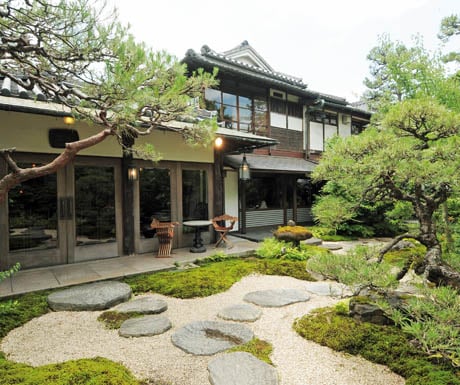 Gora Kadan, Hakone
This is probably the most expensive property in Japan averaging £1,000 a night, but if you only ever stay in one ryokan make it this one. Built as a retreat for a high-ranking Imperial family, it looks more like a western villa from the outside as this was the architectural fashion at the time. But once inside it is a haven of dark wood beams, spacious tatami mat rooms with private gardens and cedarwood baths, and perhaps the highest standard of omotenashi hospitality to be found anywhere in Japan.
Gora Kadan, Hakone
This is probably the most expensive property in Japan averaging £1,000 a night, but if you only ever stay in one ryokan make it this one. Built as a retreat for a high-ranking Imperial family, it looks more like a western villa from the outside as this was the architectural fashion at the time. But once inside it is a haven of dark wood beams, spacious tatami mat rooms with private gardens and cedarwood baths, and perhaps the highest standard of omotenashi hospitality to be found anywhere in Japan.
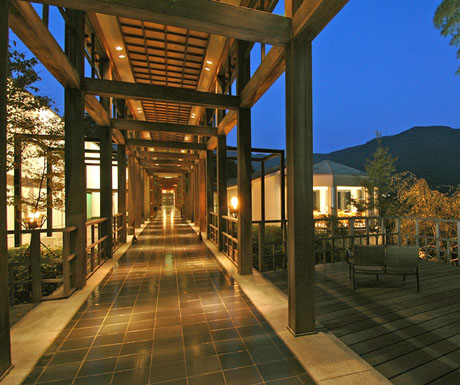 Beniya Mukayu, Yamashiro Onsen
When the current owners of the Beniya Mukayu inherited it from the previous generation, they completely remodelled it to create a fine fusion of the modern and the traditional. Each of the 17 tatami mat rooms has its own private hot spring bath looking out onto a garden with a traditional teahouse. Alongside it is a modern sculpture, and in the main building is a mesmerizing installation piece harnessing water droplets and designed by the director of Muji . Most luxury ryokan serve meals in the room, but Beniya has its own restaurant and its own take on Japanese kaiseki cuisine. It sounds like it shouldnt work, but it does, and the private elevator access to Yamashiros public hot spring baths completes the ingenious design. Rooms start at around £400 a night though this is very much dependent on the season with autumn being the most popular here.
Beniya Mukayu, Yamashiro Onsen
When the current owners of the Beniya Mukayu inherited it from the previous generation, they completely remodelled it to create a fine fusion of the modern and the traditional. Each of the 17 tatami mat rooms has its own private hot spring bath looking out onto a garden with a traditional teahouse. Alongside it is a modern sculpture, and in the main building is a mesmerizing installation piece harnessing water droplets and designed by the director of Muji . Most luxury ryokan serve meals in the room, but Beniya has its own restaurant and its own take on Japanese kaiseki cuisine. It sounds like it shouldnt work, but it does, and the private elevator access to Yamashiros public hot spring baths completes the ingenious design. Rooms start at around £400 a night though this is very much dependent on the season with autumn being the most popular here.
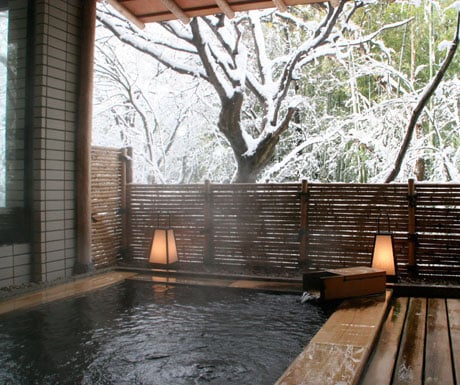 Hanafubuki, Izu Peninsula
The Izu Peninsula is a set of scenic coastal train and bus rides, winding up to the centre with the hills fading away behind you like a Japanese scroll painting. The Hanafubuki is a set of scattered villas on the Jogosaki coastline, one of the most scenic parts for coastal walks as the geological layers of rock are exposed along the jagged coastline. There is an idiosyncratic nautical theme here, with the central dining area designed to look like a ship with topmast, sail and all! The location itself is very peaceful and makes for an excellent overnight stop between Tokyo and Kyoto as its straightforward to get back on the bullet train line from here.
Hanafubuki, Izu Peninsula
The Izu Peninsula is a set of scenic coastal train and bus rides, winding up to the centre with the hills fading away behind you like a Japanese scroll painting. The Hanafubuki is a set of scattered villas on the Jogosaki coastline, one of the most scenic parts for coastal walks as the geological layers of rock are exposed along the jagged coastline. There is an idiosyncratic nautical theme here, with the central dining area designed to look like a ship with topmast, sail and all! The location itself is very peaceful and makes for an excellent overnight stop between Tokyo and Kyoto as its straightforward to get back on the bullet train line from here.
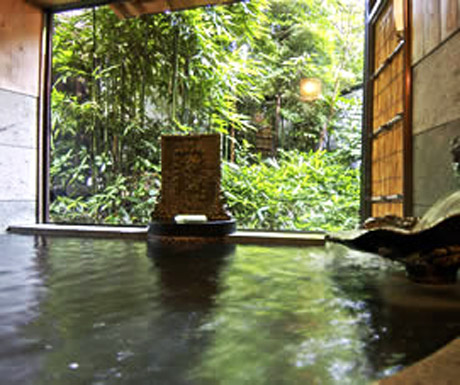 Iwaso, Miyajima
This is the place to stay on the island of Miyajima near Hiroshima, famous for its cherry blossom as well as its autumn leaves. Several other modern inns have sprung up on the island but the Iwaso is the original and best, opening its doors in the late 19th Century. Its just a short walk up from the famous floating red gate in the water, and the courtyard is postcard perfect with tame deer often wandering through. The interior has been renovated so rooms are bright and comfortable but with that quintessentially Japanese smell of tatami mats. Some have views of the shrine, but perhaps the most romantic are the Hanare cottages in the adjoining woods, where the only sounds are a distant waterfall and birdsong. Rooms start at around £400 including a kaiseki multi-course meal and breakfast both served in the comfort of your room.
Iwaso, Miyajima
This is the place to stay on the island of Miyajima near Hiroshima, famous for its cherry blossom as well as its autumn leaves. Several other modern inns have sprung up on the island but the Iwaso is the original and best, opening its doors in the late 19th Century. Its just a short walk up from the famous floating red gate in the water, and the courtyard is postcard perfect with tame deer often wandering through. The interior has been renovated so rooms are bright and comfortable but with that quintessentially Japanese smell of tatami mats. Some have views of the shrine, but perhaps the most romantic are the Hanare cottages in the adjoining woods, where the only sounds are a distant waterfall and birdsong. Rooms start at around £400 including a kaiseki multi-course meal and breakfast both served in the comfort of your room.
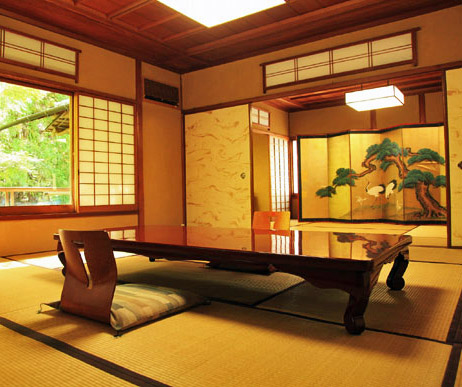 Hoshinoya, Kyoto
Once a nobles retreat, this aesthetically stunning ryokan is reached by private boat down the Hozu river in scenic Arashiyama. This area is particularly stunning in autumn when the leaves turn red and gold, and the Hoshinoya is enveloped by the trees. Rooms with evocative names like Moon and Water take the traditional tatami mat design and incorporate modern designs such as bamboo-strip sofas and bed-style futons. A grain warehouse has been ingeniously converted into an intimate bar, but the exterior of the buildings are preserved. The place resonates with a long history of luxury and is also the most peaceful place to stay near Kyoto. Like the Gora Kadan, it averages £1,000 a night with dinner by the Michelin-starred chef Ichiro Kubota.
Hoshinoya, Kyoto
Once a nobles retreat, this aesthetically stunning ryokan is reached by private boat down the Hozu river in scenic Arashiyama. This area is particularly stunning in autumn when the leaves turn red and gold, and the Hoshinoya is enveloped by the trees. Rooms with evocative names like Moon and Water take the traditional tatami mat design and incorporate modern designs such as bamboo-strip sofas and bed-style futons. A grain warehouse has been ingeniously converted into an intimate bar, but the exterior of the buildings are preserved. The place resonates with a long history of luxury and is also the most peaceful place to stay near Kyoto. Like the Gora Kadan, it averages £1,000 a night with dinner by the Michelin-starred chef Ichiro Kubota.
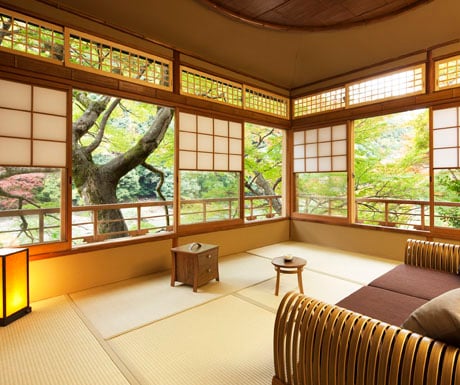 Sekitei, Miyajima
While the Iwaso is our favourite here, the Sekitei comes a very close second. The five rooms are cleverly arranged around a lovely ornamental garden so everyone has views of it and the island of Miyajima across the water, without feeling their privacy is disturbed. Maisonette rooms have living, sleeping and dining spaces as well as luxurious cedarwood baths with some of the best views. Hospitality here is second to none and you are assured of fine meals with fresh fish and seasonal ingredients that enhance this immersive cultural experience. Prices start from £400 a night including dinner.
Sekitei, Miyajima
While the Iwaso is our favourite here, the Sekitei comes a very close second. The five rooms are cleverly arranged around a lovely ornamental garden so everyone has views of it and the island of Miyajima across the water, without feeling their privacy is disturbed. Maisonette rooms have living, sleeping and dining spaces as well as luxurious cedarwood baths with some of the best views. Hospitality here is second to none and you are assured of fine meals with fresh fish and seasonal ingredients that enhance this immersive cultural experience. Prices start from £400 a night including dinner.
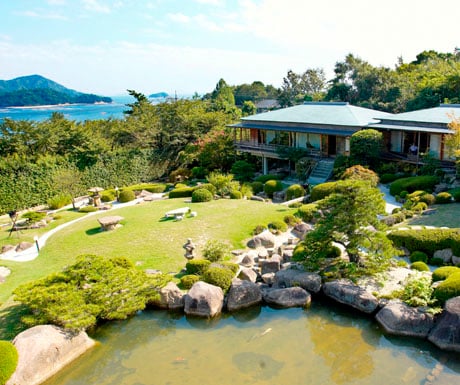 Kayotei, Yamanaka
This ryokan in the picturesque hot spring town of Yamanaka has a long and distinguished history. Like Ryokan Kurashiki, its a treasure trove of fine antiques such as hand-painted screens and the kind of ceramics that Japan is famous for. It is nestled in the forest just outside the town, with communal hot spring baths that look out onto the natural scene and provide the perfect antidote to modern living. Traditional kaiseki meals are served in the luxury of the room. Prices start from £350 a night, half board.
Kayotei, Yamanaka
This ryokan in the picturesque hot spring town of Yamanaka has a long and distinguished history. Like Ryokan Kurashiki, its a treasure trove of fine antiques such as hand-painted screens and the kind of ceramics that Japan is famous for. It is nestled in the forest just outside the town, with communal hot spring baths that look out onto the natural scene and provide the perfect antidote to modern living. Traditional kaiseki meals are served in the luxury of the room. Prices start from £350 a night, half board.
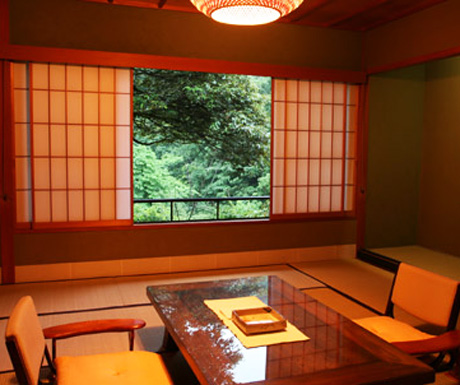 Lamp no Yado, Noto Peninsula
This far-flung peninsula on the north coast of Japan is a dream for those who like to be behind the wheel on the open road. At its tip is Lamp no Yado, a set of picturesque buildings based on the black and white fishermans houses but concealing luxury within. Each one is a little different so some are ocean facing, some have private hot spring baths. To get you as close to wild nature as possible, there is an air observatory and also a walkway which extends out over the cliff top here. The exquisitely presented meals, served in the room, include local crab catch and other delicacies fresh from the sea. Prices start at around £600 a night for this unique and luxurious experience.
Lamp no Yado, Noto Peninsula
This far-flung peninsula on the north coast of Japan is a dream for those who like to be behind the wheel on the open road. At its tip is Lamp no Yado, a set of picturesque buildings based on the black and white fishermans houses but concealing luxury within. Each one is a little different so some are ocean facing, some have private hot spring baths. To get you as close to wild nature as possible, there is an air observatory and also a walkway which extends out over the cliff top here. The exquisitely presented meals, served in the room, include local crab catch and other delicacies fresh from the sea. Prices start at around £600 a night for this unique and luxurious experience.
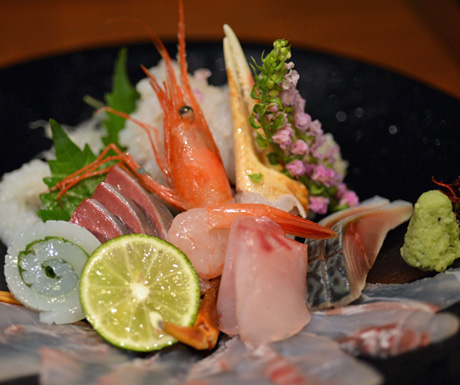 Hanaougi Bettei Iiyama, Takayama
Since winning 3 Michelin stars in 2009, Takayama has become a key location to visit in Japan. With its old wooden buildings and scenic mountain location it is the most popular place to stop in the so-called Japan Alps, and the Hanougi is arguably the best place to stay. Tucked away just on the edge of town, it impresses with its warm wood design, hot spring baths on private terraces, and its marbled Hida beef which competes with the more famous Kobe beef as the finest in Japan. The property is ideal for a romantic retreat with the sumptuous meals served in the comfort of a private room.
Hanaougi Bettei Iiyama, Takayama
Since winning 3 Michelin stars in 2009, Takayama has become a key location to visit in Japan. With its old wooden buildings and scenic mountain location it is the most popular place to stop in the so-called Japan Alps, and the Hanougi is arguably the best place to stay. Tucked away just on the edge of town, it impresses with its warm wood design, hot spring baths on private terraces, and its marbled Hida beef which competes with the more famous Kobe beef as the finest in Japan. The property is ideal for a romantic retreat with the sumptuous meals served in the comfort of a private room.
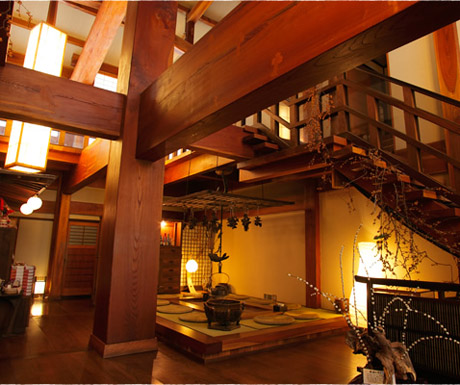 James Jayasundera is Founder and Managing Director of Ampersand Travel.
If you would like to be a guest blogger on A Luxury Travel Blog in order to raise your profile, please contact us.
James Jayasundera is Founder and Managing Director of Ampersand Travel.
If you would like to be a guest blogger on A Luxury Travel Blog in order to raise your profile, please contact us.Did you enjoy this article?
Receive similar content direct to your inbox.


i can recommend Hotel Zuhio, Akiu Onsen, Sakura Ryokan section. This is sublime, with both modern western bathroom amenities, and private outdoor onsen overlooking a gorge. Access is also included to the public onsen of the hotel. The Kaiseki dinner, and breakfast, are served in the room. It is very special.
Truly inspired to travel to Japan NOW. Thank you for the insight. This sounds exactly like my kind of trip!
WOW!!! Really an amazing blog.Truly inspired to travel to Japan NOW. Thank you for the insight. This sounds exactly like my kind of trip.w